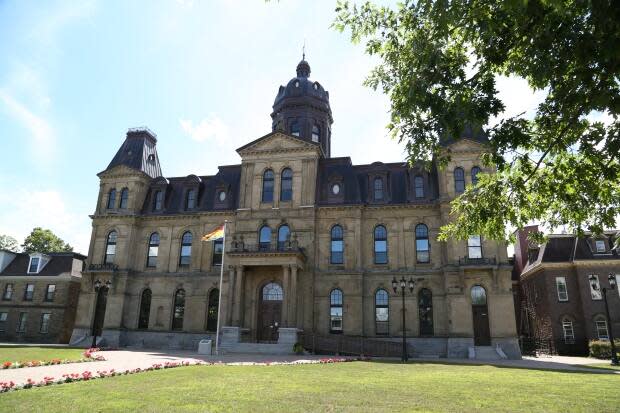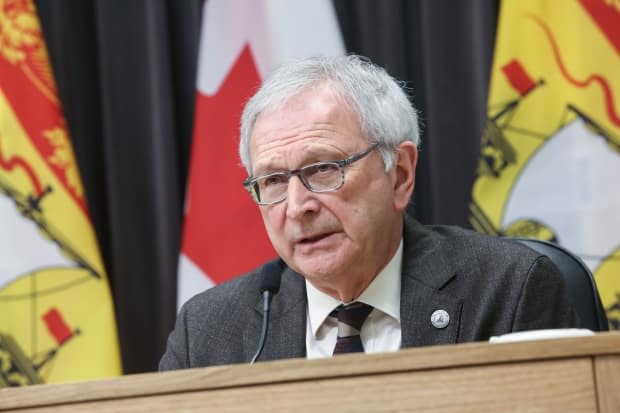With pandemic's end in sight, N.B.'s unique all-party COVID committee may also wind down

New Brunswick's unique experiment with four-party oversight of its COVID-19 pandemic measures may soon be over.
Premier Blaine Higgs and Opposition Liberal Leader Roger Melanson both say the all-party COVID committee could be disbanded when the province's state of emergency ends, something Higgs believes could happen in three or four months.
"I would guess it would be related to the emergency order, and when we no longer find it necessary to have an emergency order in place," Higgs said.
Melanson said that's one possible trigger for him as well.
The other would be when 75 per cent of people have had a first dose and 20 per cent have had a second dose — the threshold federal officials say could allow the relaxation of public health restrictions.

"That's one area where it certainly should be considered," Melanson said. "That would mean most of the pandemic would be behind us."
The all-party committee, made up of the leaders of the four parties in the legislature as well as key Progressive Conservative ministers, was formed by Higgs at the beginning of the pandemic in March 2020.
It was created in part because the emergency order drafted at that time, and still in effect now, gives the cabinet extraordinary powers to enforce public health rules — powers that need an extra level of oversight.
Higgs's government did not have a majority in the legislature at the time.
The committee is unique in Canada, and its legal status is itself an innovation: while the three opposition party leaders are not ministers, they swore oaths to respect cabinet confidentiality.
Lasted despite disagreements
"There was collaboration to some extent in other provinces, but nothing like this," says political scientist J.P. Lewis of the University of New Brunswick in Saint John.
"It's somewhat surprising it's lasted this long … It's not as if it hasn't been testy between leaders."
Last year, Green Party Leader David Coon was frustrated when he disagreed with a ban on temporary foreign workers but couldn't reveal to reporters what the committee had been told about the risk.
And earlier this year, People's Alliance Leader Kris Austin complained that shifting definitions of red-zone restrictions were causing him to question his role on the committee.
Austin said last week that he joined the committee "taking an oath of cabinet confidentiality. I did not take an oath of cabinet solidarity."
The Alliance leader said the pandemic has been a unique circumstance that required more collaboration, but in general it's not good for transparency and accountability if all parties are working together on policy.
"In a democratic system, you have to have government and you have to have an official opposition, and opposition parties, to highlight some of the things that government brings forward and to scrutinize," he said.
Lewis said the format has put the Liberals in an awkward position at times.
"You're calling for a minister of the government to resign, but your leader is kind of in the government, at least in this quasi-cabinet."
Higgs has also been torn now and then. At one point last fall, Higgs complained that Melanson was being more political than previous Liberal leader Kevin Vickers had been.
But last week he said "the genuine participation of all of the members [of the committee] has been really outstanding."
That compliment came as Higgs made a new push to use the COVID committee as a model for other issues.
Last year, the premier asked the three parties to sign a two-year agreement to not bring down his minority government in return for a four-party approach to setting the economic direction for the province.

Last week, he said the four-party approach could be applied to issues like the severe nursing shortage in the province.
"Now there needs to be a common focus on how we get better at health care outcomes, how we address the challenge we have with aging care, and how we have more services available to those who need it, where they need it, when they need it," Higgs said.
But Melanson made it clear during that heated question period exchange with Higgs that his co-operation is limited to the pandemic.
"I participated in that committee not to support your government but to work with Public Health and Dr. Russell to save people's lives during this pandemic," he said.
"When you talk about co-operation on any other matters, you want to co-operate if it fits your ideas. You do not co-operate when other people have suggestions. That's the reality in this province now, with your leadership."
Melanson later defended, however, the government's guarded approach to releasing much detail about how the virus was spreading in the Fredericton area.
Coon said he agrees the expiration of the emergency order is the right time to dissolve the committee, though he said legislation is needed "to continue to be able to manage those elements of what's left from the pandemic afterwards."
He said there may still be small outbreaks into the fall and without the emergency order in place, the province won't have the legal authority to order mask-wearing or distancing, for example.
Last week Public Safety Minister Ted Flemming introduced a bill to make sure legal deadlines extended during the pandemic, legal immunity for officers enforcing the order and charges laid under the order do not expire when the order ends.

 Yahoo Movies
Yahoo Movies 